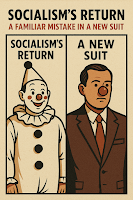The Quiet Arrangement: Mexico’s Cartels and the State-Rick wagner
When American commentators say “narco-state,” they tend to picture something cinematic — cabinet ministers counting cartel cash in back rooms, presidential palaces doubling as distribution hubs. It’s a tidy morality play. It also saves everyone the trouble of thinking too hard.
Mexico is more complicated than that. Which is precisely why it’s harder to fix.
This is not Venezuela, where the governing class and trafficking networks have largely collapsed into one another. Mexico still holds elections. It has courts, a national military, a functioning financial system. The formal state exists. It passes budgets. It gives speeches about sovereignty. It issues stern communiqués.
But beneath that formal structure lies something far more durable: an informal equilibrium.
Organized crime in Mexico is not an invading force storming the gates. It is woven into the social and political fabric. In parts of the country — particularly in northern corridors and rural strongholds — cartels function as parallel authorities. They tax commerce. They settle disputes. They decide which businesses operate and which close their doors. Occasionally, they provide more reliable “public safety” than the municipality whose seal hangs on the wall.
And the central government understands all of this perfectly well.
What exists is not total capture but negotiated coexistence. Federal power asserts itself where it can. Cartel power dominates where it already does. Local officials calculate survival like actuaries. Confrontation is expensive. Accommodation is survivable. And so an understanding develops — not written, not acknowledged, but very real.
The alternative to this arrangement is not Scandinavian rule-of-law nirvana. It is prolonged internal conflict in regions where the state’s capacity is thin and public trust thinner. So instead of absolute victory, Mexico practices managed friction.
Washington calls this corruption. Mexico City often calls it stability.
Violence spikes when boundaries are crossed or rival groups disturb the balance. Otherwise, the machinery hums along. Elections proceed. Governors campaign on reform. And in the background, narcotics move north with impressive logistical competence — a supply chain that would make certain federal agencies blush.
The result is neither a collapsed state nor a sovereign one in full control. It is a hybrid: formal institutions layered over informal power networks, each tolerating the other so long as the basic architecture holds.
For the United States, the difficulty is obvious. The equilibrium functions — just not in our favor. As long as internal Mexican stability is preserved, the external consequences remain secondary.


.jpg)












.png)











